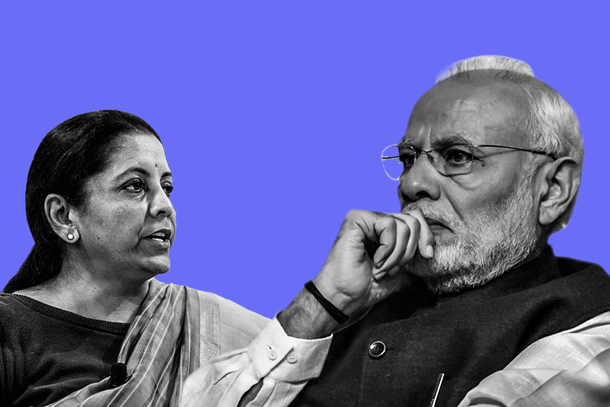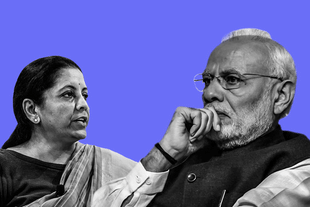Economy
Government Taking Too Long Over Covid-19 Relief; Big Bang Isn’t Needed, But Little Bangs Will Help Dispel Gloom
R Jagannathan
May 07, 2020, 12:28 PM | Updated 12:49 PM IST
Save & read from anywhere!
Bookmark stories for easy access on any device or the Swarajya app.


One can understand the government’s reluctance to rush in with massive fiscal relief packages for businesses and workers given the sheer number of potential claimants involved and the shrinking resources of the government. But it is difficult to understand why specific packages for specific sectors are so difficult to design. Delay kills hope, and when hopes are killed, they can lead to long-term loss of business confidence.
Starting from the most vulnerable to the least, it should not be too difficult to announce rough and ready relief packages for all over the next one month.
For migrant and daily-wage workers, an Aadhaar-Jan Dhan-based cash payment equivalent to Rs 100 per day per household would probably cost Rs 75,000 crore a month. This can be given prospectively for May and June, and discontinued after some semblance of normality returns by July.
Small and medium businesses which have reported worker numbers to the Employees Provident Fund Organisation (EPFO) can be given interest-free credit equivalent to three months’ wage bills. This implies that the government will pay banks something like 5-6 per cent interest on the additional credit, given that banks are currently parking upto Rs 8.5 lakh crore in the Reserve Bank of India’s (RBI’s) reverse repos at 3.75 per cent.
Those outside the EPFO ambit can be given the same credit line assuming an average worker base of 10 per firm (after 20, you anyway have to join the EPFO). This will obviously leave out firms, which have under-reported the workforce or belong entirely to the informal sector, but no scheme is guaranteed to be 100 per cent. It should act as a goad to join the EPFO safety net.
The big question is: will banks extend more loans to small and medium enterprises? The answer is maybe. But it would help if the government sets up a loan guarantee fund for at least 25 per cent of the additional amounts lent (ie, for the three months of extra credit given).
Entitlement to the guarantees can be tapered, with the first banks to lend being given more protection (30 per cent guarantee) and the later ones less (20-25 per cent). This way banks will be prodded to lend more quickly.
This brings us to specific sectors.
The auto sector needs no special bailout; it should, however, get regulatory leeway to sell old inventories and postponement of the Bharat VI norms until 1 October. The bus and commercial vehicles sector should, however, get a fillip through lower goods and services tax (GST) rates and interest-free credit to fleet buyers.
Post-Covid-19, we can’t pack our public transport buses like sardines. Single-truck owners can be given interest-rate subventions provided they scrap older vehicles. This means the Centre will foot the interest costs of loans made for the purchase of fleets. Again, this will prompt banks to lend to state transport corporations, which are quasi-sovereign borrowers.
The telecom sector needs no general bailout, but needs two assurances: the first is lower spectrum reserve prices in future with spread out payment timelines. The second assurance is simpler: for at least a year or two, the sector regulator should not look at tariff increases with suspicion. This will help the third and weakest operator, Vodafone, a chance to pull itself up by the bootstraps. If it does not, the remaining duopoly can be regulated more firmly in future, both on tariffs and collusive practices.
The airline sector needs interest-free credit for three months to the extent of its wage bills; it can also be given a temporary cut in aviation turbine fuel taxes and airport charges. Like telecom, and given the need to incur higher costs on maintaining social distancing in flights, fares should be allowed to go where they will, perhaps upto 50-75 per cent more than where they were when the lockdown began.
The hospitality sector, one of the worst sufferers in the lockdown, should also be given interest-free credit for the period of the lockdown, and fiscal incentives during the reopening phase.
The real estate sector should be given only conditional credit and reliefs. No relief unless house prices are brought down by significant amounts (say, 15-20 per cent). There can, however, be special packages for low-cost housing in cities, but available only to cities which have reformed building laws.
Special conditions should be imposed on local and state governments that land prices must be brought down significantly by urban authorities by changing building laws and zoning restrictions, and by giving permissions for vertical building. Cities like Mumbai can claim interest-free credit for erasing slums and housing the residents in high-rises.
The construction sector should be given interest-free credit for the period work was stopped; appropriate changes in toll collection periods can also be included as addendums to the contracts for road and infrastructure builders.
The power sector needs a full and final solution where discoms clear their dues quickly, making powergen companies viable. But power tariffs need to be raised so that discoms themselves are viable. A one-time loan write-off for the most insolvent power companies with good assets can also be considered.
The banking sector needs more capital, from the markets or government, and a toxic assets war chest to rescue small and medium non-bank finance companies.
FMCG, pharmaceutical companies, pharmacies, small retailers, liquor and cigarette companies, the oil sector, and e-tailers need no special benefits even though they too would have suffered some erosion in business revenues. But they have been the only people allowed to function during the lockdown, and can presumably make up for their losses when the economy starts booming.
The above list is by no means an exhaustive list of sectors and what they should (or should not) get as relief. The point is that the government does not have to deliver the entire package in one fell swoop. Sector-specific packages can be announced a few at a time so that they don’t start losing hope.
The government has done nothing (though the Reserve Bank of India has) since end-March, when the Rs 1.7 lakh crore package was announced at the start of the lockdown. This huge time gap is inexplicable and ruinous. It is why migrant labourers were forced to leave for their homes in despair.
Jagannathan is former Editorial Director, Swarajya. He tweets at @TheJaggi.




